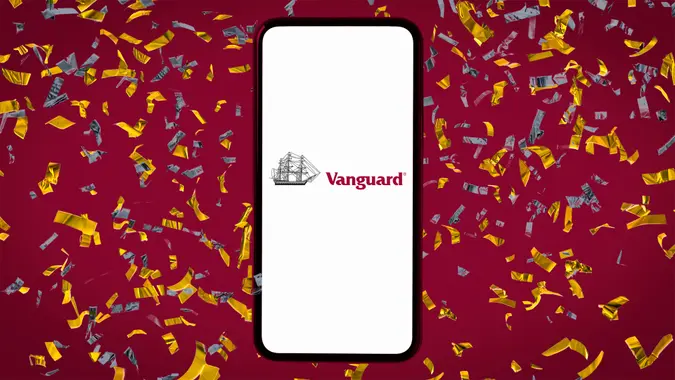What Do You Do When Your CD Matures?

Commitment to Our Readers
GOBankingRates' editorial team is committed to bringing you unbiased reviews and information. We use data-driven methodologies to evaluate financial products and services - our reviews and ratings are not influenced by advertisers. You can read more about our editorial guidelines and our products and services review methodology.

20 Years
Helping You Live Richer

Reviewed
by Experts

Trusted by
Millions of Readers
Once your CD matures, you’ll receive your final interest payment and the return of your original deposit.
However, taking the money out is only one of your options, so it’s important to understand the terms of your investment.
3 Options Available When a CD Matures
When your CD matures, you have several paths to consider. Each option offers different benefits and should be chosen based on your current financial situation and future goals. Here are the main options.
1. Roll Over Into a New CD
The most straightforward option is to renew your CD. Many banks offer an automatic rollover feature where both the principal amount and any accrued interest are transferred into a new CD. The new CD typically carries the same term as the original CD, but the rate offered may be higher or lower, depending on market factors.
It’s crucial to evaluate the interest rates during the grace period provided after maturity. Interest rates may vary since your first investment, and the grace period is an optimal time to survey the market for potentially better rates or terms before committing to a rollover.
2. Withdraw the Funds
Opting to withdraw both the principal and the interest gives you immediate access to your funds. This flexibility is ideal for covering emergency expenses, making significant purchases or reallocating funds for alternative investments.
Consider transferring the amount directly into your checking account for easy access and immediate use.
3. Transfer to Another Account
If you’re not keen on renewing the CD, consider transferring the funds to a high-yield savings account or a money market account. These options offer more flexibility and can still accrue reasonable interest.
However, it’s important to note that these types of accounts pay variable interest rates that can fluctuate from month-to-month or even from day-to-day, unlike the fixed terms offered by CDs.
Grace Period: What It Is and Why It Matters
A grace period is a window following your CD’s maturity, allowing for changes or decisions regarding your investment without penalties. This critical time frame offers the flexibility to reassess your investment strategy post-maturity. However, if you don’t notify your bank of your intentions before the grace period expires, your CD proceeds will be automatically renewed.
Grace Periods at Major Banks
Grace periods can vary significantly between financial institutions, typically ranging from 7 to 10 days after maturity. Key examples include:
- Chase: 10-day grace period
- Bank of America, 1-7 days
- Wells Fargo: 10-day grace period
- Ally Bank: 10 days
- Synchrony Bank: 10-day grace period
- Capital One: 10 days
Use the grace period to research the best interest rates for your money.
Understanding Automatic Renewal
Automatic renewal is generally a win-win for both banks and customers. Banks get to maintain customer CD accounts by automatically rolling the money over, and customers, many of whom are conservative, long-term CD investors, don’t have to worry about finding new CDs and contacting the bank to reinvest.
Usually, automatic renewals process within 7 to 10 days after a CD matures, and the process is seamless.
However, the main drawback of automatic renewal is that your money might get reinvested at a lower rate. It also resets the clock on your early withdrawal penalty, meaning you once again can’t access your funds without penalty until maturity.
Alternatives To Consider After CD Maturity
Here’s a closer look at the pros and cons of the main alternatives to renewing your CD:
- High-yield savings accounts: HYSAs offer instant liquidity and competitive interest rates that can be higher than what some CDs pay. However, rates are variable, so you can’t lock in a high rate if you anticipate that market rates will fall.
- Treasury securities: Treasury securities are among the safest in the world, as they are backed by the full faith and credit of the U.S. government. However, they generally pay slightly lower yields than CDs, due to their immense safety. Treasury securities may fluctuate in value based on movements in market interest rates. However, if you hold them until maturity, you are guaranteed to receive the return of your principal.
- Money market accounts: Like high-yield savings accounts, money market accounts pay a variable rate of interest that can change from month-to-month or even from day-to-day. But they also offer immediate access to funds, via ATM/debit cards and/or checks. Yields can be high with some online banks.
- Diversifying with other types of CDs: You can diversify some or all of your CD portfolio by investing in non-traditional CDs. No-penalty CDs, for example, allow you to get out of your CD before maturity without paying an early withdrawal penalty, offering additional flexibility. Bump-up CDs allow you to get a higher interest rate if your bank starts offering better rates.
How To Avoid Pitfalls at CD Maturity
As you approach the maturity date of your CD, it’s essential to take proactive steps to ensure you make the best decision.
- Stay informed about your CD’s maturity date and understand the grace period offered by your bank. This period is crucial as it allows you to make changes without penalty.
- Assess your financial goals. Your decision at the CD’s maturity should reflect your current needs and future objectives, especially if these have changed since you first invested in the CD.
- Don’t hesitate to seek professional advice. If you’re uncertain about the best course of action, a financial advisor can offer tailored guidance based on your overall financial situation. This expert input can be invaluable in navigating your investment choices.
FAQ
- What happens if I don't act when my CD matures?
- Oftentimes, your financial institution will automatically renew your maturity CD funds into a CD of a similar term at the going market rate.
- Can I withdraw my CD funds before the grace period ends?
- Yes, you can access your CD money at any time. During the grace period after maturity, you can withdraw it free of charge.
- Is it better to roll over a CD or explore other savings options?
- Whether or not you should roll over your CD depends on a number of factors. Your personal financial needs, financial objectives, risk tolerance and the rate you're offered all play important roles. You may want to speak with a financial advisor to make the best choice for you.
- How do banks notify customers of CD maturity?
- Banks usually notify CD holders in writing a few weeks before their investments will mature. This can come in the form of a written letter or an electronic message.
- What should I do if my bank offers a lower renewal rate?
- If your bank offers a lower renewal rate, you have the option to take the money in cash. However, if market rates have dropped, your bank may still be offering a competitive rate, so it pays to shop around before you make any decisions.
Casey Bond contributed to the reporting for this article.
 Written by
Written by  Edited by
Edited by 

























